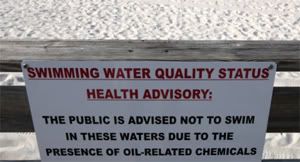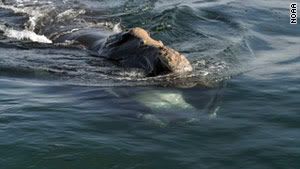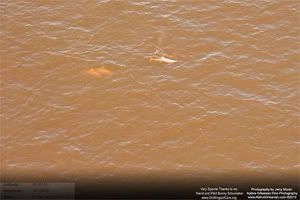
photo credit The Associated PressIt's been a busy week. The numerous religious holidays are upon us, but besides that we've had both Earth Day and the one-year anniversary of the BP Deepwater Horizon oil disaster. But don't worry - it hasn't gone unnoticed. So for our dear Mother Earth, let's have a look at what exactly is happening one year after the blowout that led to the greatest environmental disaster in US history.
"As the one-year anniversary of the BP oil spill approaches, some scientists have deemed the health of the Gulf of Mexico as 'nearly back to normal,' though countless workers involved in cleaning up the aftermath of the disaster are reporting mysterious and unexplained illnesses."The people employed by BP and related agencies to clean up the mess in the Gulf have been consistently reporting symptoms such as severe headaches, nausea, respiratory infections, trouble breathing, dizziness, constant cough, rashes and other ailments. Although BP will be quick to tell you there is no definite correlation between these symptoms and working at the cleanup sites - the trend is clear. People are sick.
"During the hot summer cleanup last summer, Andre [a cleanup responder]
says planes would fly overhead spraying chemical dispersants that would drift over the workers, burning people’s skin and making it hard to breathe. Andre says he watched workers collapse from exposure to toxic fumes of the oil. Soon, Andre says he succumbed himself and spent days in the hospital with 'tubes and IV coming out of everyplace in my body.'"To add insult to injury (literally), when Andre tried to ring BP about the $21,000 in medical costs they agreed to pay for, he found the line had been disconnected.
So where does BP stand on its response program? Ask Ken Feinberg, the man put in charge of dolling out the $20 billion set aside for claims against BP:
"
The program is working in terms of money going out the door. We're spent! We're paid out! In the last seven months we're approaching $4 billion, including about $1.7 billion for Louisiana."The people of Louisiana and other Gulf states, however, are not as satisfied. In a meeting with Mr. Feinberg himself, several voices stood out among the crowd:
"You know, Tony Hayward waned his life back, but everybody in this building wants their life back...You say you've paid so many people in Lafourche [Louisiana]
? I don't know one of them."
"What about the people, myself included, that's lost everything that they had? Everything that they've worked for, everything that they took pride in? And you can't get no help from nobody, because there is none. Because ya'll tell everybody that everything's fine in the Gulf of Mexico. Don't worry about nothin'. Everything's gonna be back to normal...When in fact, you're sitting there lying to our faces."
"We had the best [shrimp]
product in the world - Now we're known as an oil product!"And talks of expanding offshore drilling are on the rise! Can you believe it?!
Interior Secretary Ken Salazar told reporters
"Some of the members of Congress are acting as though the Deepwater Horizon well oil spill never happened."Says David Yarnold, president of the National Audubon Society,
"In the wake of the Exxon Valdez spill off Alaska in 1989, lawmakers passed sweeping new laws raising the financial liability of oil companies, expanding cleanup demands and improving the strength of tanker hulls. This time, they’ve done nothing."So the effects on the human population of the Gulf of Mexico are pretty clear...but are similar things happening to the marine life? The truth is, science doesn't know - and probably won't know for some time - but the people of the Gulf have their own observations.
"This is Dead...This is Dead...This is Dead..." says Nick Collins as he sorts through his oyster catches.
"It's the biggest oyster kill in Louisiana history, probably in the Gulf Coast's history...And I wish I wasn't part of it, I wish I wasn't here."Dead dolphins and turtles have been washing up on the shores in record numbers. Patches of seabed are smothered and dead. Oil continues to wash ashore. And yet it's been difficult to find data on the long-term effects and environmental impacts. LaTosha Brown, Director of the Gulf Coast Fund, describes it as "The Great Gulf-Coast Experiment" - and she's not half wrong.
So what needs to happen that hasn't happened yet?
"First of all, there has to be an acknowledgement that there hasn't been of the severity of the damage to the ecosystems and to the communities that rely on these ecosystems. Then, number two, if that happens, there has to be meaningful, sustained and community-informed response or decision-making about restoring - to the full extent of that impact - what needs to be done. And neither of those two mandates have been met or are really well on their way to being met," says Derrick Evans, Director of Turkey Creek Community Initiatives.
There is still oil in the Gulf. The disaster isn't over. We're beginning to get a clear idea of what is happening to the human life of the area, but it may still take years to understand the full environmental impacts. Don't let a few news articles or commercials tell you everything in the Gulf of Mexico is "back to normal." We are still fighting this battle. The residents are still fighting this battle. The marine life will continue to fight this battle for a very, very long time. Everything is not okay in the Gulf. A year on, and we've still got a hell of a lot of work to do.
More information & articles:
BBC World Service Assignment: Louisiana Deepwater - BP Gulf of Mexico Oil SpillGulf Oil Spill Cleanup Workers Report Mysterious Illnesses Year After Disaster - Huffington PostA Year after the BP Spill, Drilling Discussion on the Rise - Miami HeraldGulf Tides 12: One Year Later - BP Drilling Disaster - April 20, 2011 - Gulf Restoration Network


